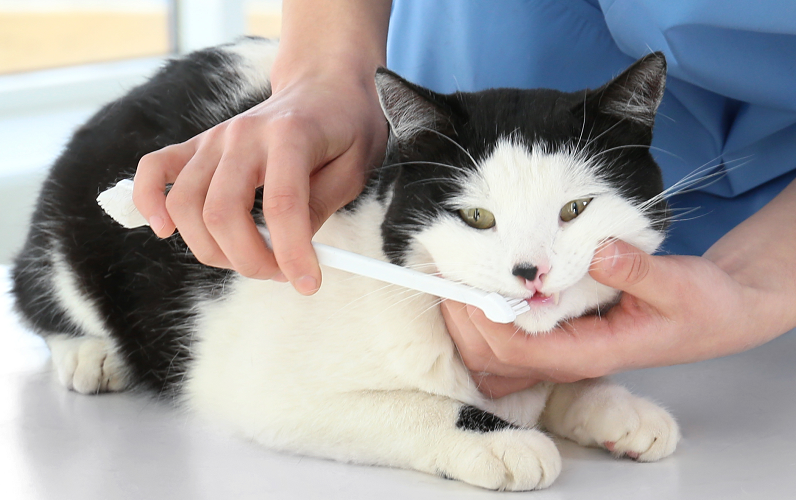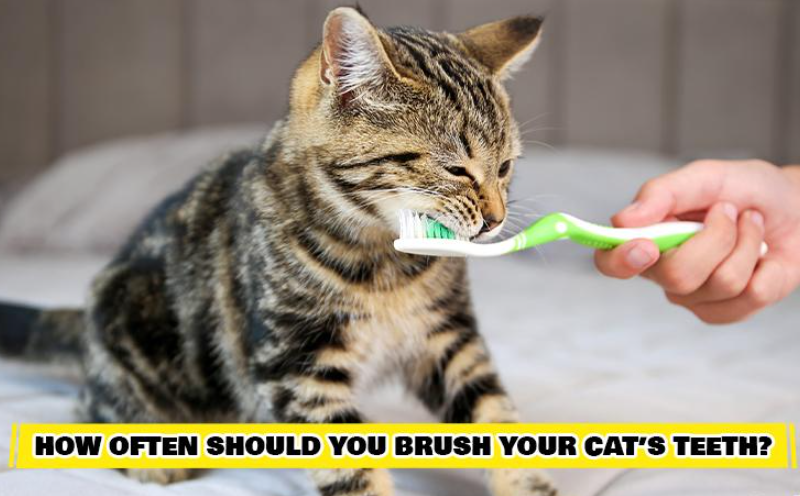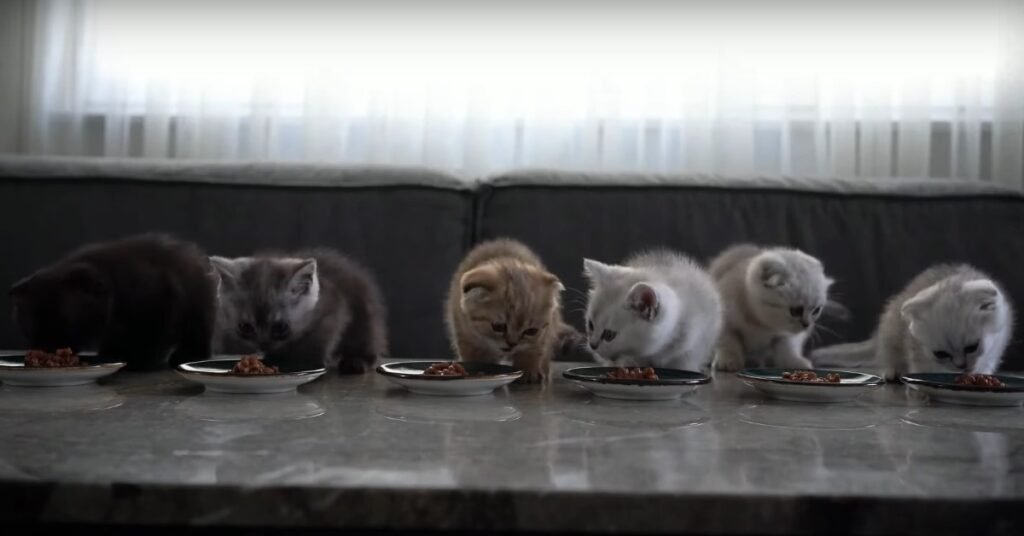
Did you know that over 70% of cats over age 3 already show signs of dental disease, and senior cats are at the highest risk? Dental health problems can lead to pain, infections, and even serious issues with the heart, kidneys, and liver.
That’s why caring for your older cat’s teeth is not just about a bright smile. It’s about comfort, health, and helping them enjoy their golden years.
Brushing your senior cat’s teeth may sound tricky at first, but it can make a big difference. A consistent dental care routine lowers the risk of gum disease, keeps their mouth pain-free, and supports overall well-being.
This guide will walk you through everything you need to know: why dental care matters, how to brush your older cat’s teeth safely, and simple tips to improve senior cat dental health every day.
If you are in a hurry, here’s a simple answer:
Put a small amount of toothpaste on a toothbrush or washcloth and gently rub it on the outside of your cat’s teeth, especially the back molars. Brush carefully along the gum line to clean thoroughly.
What happens if you don’t brush your senior cat’s teeth?
Plaque starts to build up on teeth within days. Over time, it hardens into tartar that irritates the gums. This leads to gingivitis, painful swelling, and bleeding in the mouth.
As the disease progresses, teeth loosen and infections spread. Eating becomes difficult, and your cat may avoid food. Pain changes behavior too. Some cats become withdrawn or even aggressive.
How dental health affects a senior cat’s overall health
Oral bacteria don’t just stay in the mouth. They can enter the bloodstream and damage the heart, kidneys, and liver. For senior cats, these organs are already more fragile. Poor dental health can shorten life and make daily comfort harder.
Benefits of brushing an older cat’s teeth
Brushing an older cat’s teeth keeps plaque and tartar from building up and prevents gum disease. It reduces bad breath and lowers the risk of painful infections that can affect the heart, kidneys, and other organs. Regular brushing strengthens teeth and gums, helping your cat eat comfortably and stay healthy longer.
How Do You Know If Your Senior Cat Has Dental Problems?
Senior cats often hide pain, but their mouths reveal important signs. Studies show that up to 85% of cats over age six develop dental disease. By the time a cat reaches senior age, the risks are much higher. That’s why spotting the symptoms early is critical.
Common Signs of Poor Dental Health in Older Cats
Dental problems in senior cats often show in simple but clear ways:
- Bad breath that smells sour or foul
- Drooling or wet fur around the mouth
- Pawing at the mouth or rubbing the face
- Eating less, chewing on one side, or dropping food
- Sudden weight loss from avoiding meals
These symptoms signal more than mild discomfort. They often mean gum disease, infections, or tooth decay that can worsen without care.
When to See a Vet Before Brushing
Some conditions make brushing unsafe without professional help. A vet check ensures your senior cat is ready for home care.
- Visible mouth pain or refusal to eat
- Gums that bleed, swell, or look red
- Loose or broken teeth
- Signs of pus, abscess, or severe bad breath
A vet may recommend a dental cleaning before you begin brushing at home. This step prevents pain and makes future brushing safe and more effective.
How to Brush Your Older Cat’s Teeth Safely
Brushing a senior cat’s teeth can feel overwhelming at first. Yet studies show that regular brushing can reduce plaque buildup by up to 70%. This simple habit helps prevent painful gum disease and keeps your cat’s mouth healthy.
What supplies do you need to brush your senior cat’s teeth?
The right tools make brushing safer and easier. Always use products designed for cats. Human toothpaste can harm them. Here’s what you’ll need:
- Cat-safe toothbrush – soft bristles protect delicate gums.
- Finger brush – easier for cats who resist regular brushes.
- Vet-approved toothpaste – flavored pastes make the process less stressful.
Step-by-step process for brushing an older cat’s teeth
Start slow. Stay calm. Brushing should be a positive experience. Follow these simple 5 steps:
- Pick a quiet time when your cat feels relaxed.
- Put a small amount of toothpaste on a toothbrush or washcloth.
- Gently rub the toothpaste on the outside of your cat’s teeth, especially the back molars.
- Brush carefully along the gum line to clean thoroughly.
- Keep each session short (up to 30 seconds) and follow the same process everyday.
A 2018 veterinary study found that cats who were gradually trained to brushing tolerated it better long-term. Patience is key.

How often should you brush your senior cat’s teeth?
Daily brushing offers the best protection against dental disease. Still, brushing two to three times per week can make a noticeable difference. Consistency matters more than perfection. Every small step helps protect senior cat dental health.
What If Your Older Cat Hates Tooth Brushing?
Not every senior cat will accept tooth brushing right away. Some resist because of age, pain, or simple dislike of the process. Research shows that nearly 85% of cats over six years develop dental disease, so avoiding care is not an option. You just need patience and the right approach.
How to train a resistant senior cat
Training takes time, but small steps make progress possible.
- Start by letting your cat taste the toothpaste without brushing.
- Touch their lips gently before introducing a toothbrush.
- Use short sessions, only a few seconds at first.
- Reward with praise or a healthy treat after each attempt.
This gradual desensitization helps build trust. With consistency, many cats learn to tolerate brushing.
Alternatives to brushing an older cat’s teeth
Some cats never accept a toothbrush. That does not mean you should give up. There are safer options that still support senior cat dental health:
- Dental wipes: Easy to use and less invasive than brushes.
- Water additives: Reduce bacteria and freshen breath.
- Dental treats or chews: Help scrape away plaque naturally.
- Special diets: Veterinary dental diets can improve oral health.
These tools do not replace brushing fully, but they add valuable protection.
When brushing may not be safe
Brushing is not always the right choice. Frail senior cats or those with advanced dental disease may experience pain during the process. Cats with loose teeth, bleeding gums, or severe oral infections need professional care first. Always check with your vet before starting a routine if your cat shows these signs.
See more: Risks of teeth cleaning in older cats
How to Improve Cat Dental Health Beyond Brushing
Brushing is essential, but senior cats need more than just daily teeth care. Professional guidance, proper diet, and preventive routines keep their mouth healthy. Studies show that cats receiving regular dental care are 40% less likely to develop severe gum disease.
Vet-Approved Professional Dental Cleanings
Professional cleanings remove plaque and tartar that brushing cannot reach. Veterinarians recommend annual or biannual cleanings for senior cats. This process also helps detect early signs of infections, tooth decay, and oral tumors.
Choosing the Best Diet for Senior Cat Dental Health
Diet plays a vital role in dental care. Certain foods reduce tartar buildup while supporting overall health. Consider these options:
- Wet food: Helps keep cats hydrated and easier to chew, gentle on gums.
- Dental kibble: Specially designed to scrape plaque off teeth while chewing.
- Balanced nutrition: Ensure protein, vitamins, and minerals support immunity and oral health.
Supplements and Dental Chews for Older Cats
Supplements and chews support teeth and gums naturally. Research shows enzymatic chews reduce plaque by up to 30% in senior cats. Options include:
- Enzymatic dental treats
- Oral gels or rinses recommended by vets
- Omega-3 supplements for gum health
Preventive Care Routine to Keep Teeth Healthy Long-Term
Consistency matters. Combine brushing, diet, and vet care for lasting results:
- Brush teeth 2–3 times per week, minimum
- Offer dental treats or chews regularly
- Schedule professional cleanings annually
- Monitor for signs of discomfort, bad breath, or bleeding gums
A structured preventive routine helps your senior cat stay healthy, comfortable, and happy.
Senior Cat Dental Health FAQs
1. Do Senior Cats Need Anesthesia for Dental Cleanings?
Yes, most senior cats need anesthesia for thorough dental cleanings. It allows veterinarians to remove tartar and plaque safely without causing stress or pain. Anesthesia also helps vets examine every tooth and treat hidden infections or damaged gums. Veterinarians carefully monitor senior cats during the procedure to reduce risks and ensure their safety.
2. What’s the Safest Toothpaste for Cats?
Cats cannot use human toothpaste because it contains fluoride and detergents that harm them. Vet-approved toothpastes are safe for cats to swallow and come in flavors they enjoy, such as poultry or fish. These formulas contain enzymes that fight plaque and reduce gum inflammation naturally. Using a proper cat toothpaste ensures effective cleaning without risking your senior cat’s health.
3. What is an alternative to brushing a cat’s teeth?
If your cat refuses brushing, there are other ways to protect their teeth. Dental treats, water additives, and vet-approved dental gels can help reduce plaque and freshen breath, while regular checkups with your veterinarian ensure any dental issues are caught early.
4. What raw food cleans cats’ teeth?
Raw meaty bones like chicken necks, turkey necks, or small raw ribs can help scrape away plaque and tartar as cats chew. The natural tearing and crunching action works like a toothbrush and keeps teeth and gums healthy.
5. What is the best dental rinse for cats?
The best choice is a vet-approved, alcohol-free rinse made for cats, such as those with chlorhexidine. This type of rinse helps kill bacteria, reduce plaque, and keep your cat’s breath fresh without harming their health.
6. What food improves a cat’s dental hygiene?
Special dental diets and treats designed to reduce plaque can keep teeth cleaner. Crunchy kibble and raw meaty bones also help scrape off buildup, supporting fresher breath and healthier gums.
7. Can cats have Listerine?
No, cats should never have Listerine. It contains alcohol and other toxic ingredients that can harm their mouth, stomach, and organs even in small amounts. Always use vet-approved dental products made for cats.
8. Why is dental cleaning for cats so expensive?
Dental cleaning for cats is so expensive because it requires anesthesia, trained veterinary staff, and special equipment to safely clean below the gumline. The cost also covers exams, monitoring, and sometimes X-rays to check for hidden problems, making the procedure both safe and thorough.
9. How much is a cat’s teeth cleaning without insurance?
The cost of professional cat dental cleaning without insurance typically ranges from $100 to $600, with a national average of approximately $314 in the United States. However, if your cat requires additional procedures such as tooth extractions, dental X-rays, or specialized care, the total cost can escalate to $900 to $2,000 or more.
10. How much do vets charge to clean cats’ teeth?
Vets typically charge $100 to $600 for a standard cat dental cleaning without insurance. If your cat needs extra procedures like tooth extractions, X-rays, or blood tests, the total can rise to $900–$2,000 or more. Costs vary by clinic, location, and your cat’s health condition.
Final Thoughts on Senior Cat Dental Care
Dental care gives your senior cat comfort, better health, and a longer life. Healthy teeth reduce pain, prevent infections, and support overall well-being. A simple daily routine can keep your cat happy and active.
Start slowly and stay consistent. Even short brushing sessions or dental wipes help. Positive habits build over time and make a big difference.
If you’re unsure where to start, talk to your vet about your senior cat’s dental health. Small daily steps can make a big difference in their golden years.

